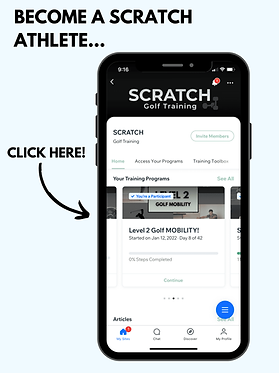Physical Screens (Assessments)... No More.
My views on this topic have changed pretty dramatically over time...
I used to think assessments, physical screens, and "functional" movement tests were NECESSARY.
No more.
Let's dive in...
.
.
.
Left and right golf practitioners make use of "assessments" or physical screens.
They check how much an athlete's wrist can bend, and hip can rotate.
They check their balance and "stability" in a constrained environment that is in NO WAY similar to the golf course (where you actually perform your sport and express your physical outputs).
Physical screens, how they are currently used, are pretty much worthless in my opinion.
My goal at SCRATCH Golf Training is to help YOU become a better version of yourself and improve your golf performance along the way... which doesn't in anyway require me to sell you a $300 useless physical screen.
I went on a Twitter rant about this topic, and I want to take a chance to expand on the points I made.
Why I don't use Physical Screens (at least, the kind that most coaches use)...
[1.] They're redundant.
99% of what a coach learns in an assessment can be learned while you coach/train.
It doesn’t take a $300 assessment to discover that you lack hip mobility.
"But, don't you need to know about the athlete's limitations?"
No, not really.
First, because 95% of the athletes have the same central "deficiencies" according to the physical screens most commonly used.
And even more importantly, why does a subjective physical screen get to decide where you are limited?
For example, an assessment might tell an athlete that they have "limited" ankle mobility on their right side. But have you ever actually watched that athlete perform their sport? Because if you did, you would see that they have self-organized into a golf swing around that "limitation" and now that "limitation" is actually their strongest asset (@ Jon Rahm).
If you just look at the clinical assessment and draw conclusions (which 95% do) you would have totally missed this.
Further, anything that I, as your coach, do need to know about deficiencies I will learn while coaching you.
I will see that you lack hip mobility when I tell you to goblet squat and you stop a foot above parallel.
I will see that your right shoulder is lacking stability when we complete a regressed crawling variation.
It's not rocket science.
[2.] They fail to look at the human behind the golfer.
“Your ankle mobility appears to be the issue”
Meanwhile the athlete has a job that they hate, eats junk, boozes 4 times a week and is going through a divorce... but yeah, ankle mobility is the fix!
Practitioners get so caught up in the "physical" piece of the assessment that they forget to understand the HUMAN they are working with.
And the HUMAN piece is so much more important than clearing an immobile ankle.
[3.] They can be intimidating and set the athlete up for failure.
A new athlete walks into a gym and the first thing they experience is a coach judging their every move.
Saying things like “Yep, we’ll have to get your hip mobility fixed up.”
Newsflash you’re not broken.
You don't need to be "fixed" like a car.
You’re just completing a test you haven’t studied for.
Of course you are going to suck at many of the physical screens and assessments you are being put through.
It's your first time doing them, in a novel training environment, with loud music on in the background, and an athlete in the corner grunting while squatting 315 lbs in a cutoff t-shirt and short shorts.
Stress is high, and then on top of that here is a list of physical screens we are going to go through that you are going to suck at and my expertise, as your coach, is needed to judge your every move.
Sounds fun!
[4.] Separate, Isolated Skills with NO Connection to your Golf Swing
Practitioners try very hard to link every assessment to a golf swing flaw, which is misleading at best and a straight up lie at worst.
Just because you suck at overhead squatting, doesn’t mean you’re going to early extend or have a bad golf swing.
Every physical screen that you complete within an assessment is a skill.
Every movement you take on in life is a skill.
Some more complex than others.
Running is more complex than walking... but both are skills.
Powerlifting is a skill.
Golfing is a skill (and it can be separated into micro skills within the game such as putting, driving...).
Completing a physical screen is a skill.
And what happens when you try a skill for the first time?
You suck at it.
What happens when you try said skill a few times?
You get better.
So, now let set up a scenario for you:
You walk into a new gym. It's intimidating. Loud music. A jacked coach. He embarrasses you by making you do a bunch of physical screens that you suck at. Then, he sits you down and tells you everything that's wrong with your body. He convinces you that you NEED him and you are lucky to have found him when you did. You walk away feeling horrible about yourself.
That's bad enough, but let me continue.
You stick it out, train with the coach for a little and you retest the assessment a month later.
You are now more comfortable with the gym, the music volume, and the meathead personality of the coach.
What do you think is going to happen this next time you take on the assessment?
No way, massive improvement!
Did you actually improve your hip mobility by 10 degrees? Or did everything else just get more comfortable surrounding the assessment? Maybe you just got more comfortable with the physical screens themself, making them easier to accomplish.
"When a measure becomes a target, it ceases to become a good measure" - Goodhart's Law

[5.] They're wildly expensive
They can be $$$$$$$.
I've seen north of $300.
And what are you paying for?
Just to step into the gym?
To give the coach a platform to wow you with their "expertise."
I'll pass.
[6.] You don't need anything drastically different than the golfer next to you
The majority of golfers need the exact same thing.
Strength training.
Move in novel ways and more often.
Some mobility work.
Rotate fast.
Even if your movement screen tells you something completely different than the athlete next to you, you both are going to train in 95% the same way.
So, why was the physical screen even necessary?
Why did you spend hundreds on it?
.
.
.
Assessments and physical screens are pretty pointless (how they're currently put to use).
Just start training.
Start with regressed versions of exercises and progress as quickly as possible.
Learn on the fly.
Not only will it save the athlete the assessment cost but it's way more effective for the coach to actually see movement patterns in training than during a constrained, judgmental assessment.
Test things that actually matter and will transfer to your sport like strength numbers, clubhead speed, a few jumps and/or med ball throws.
Drop the pointless physical screening.
There's my rant for the day.
Join the training community below if you want to level up...
Let's go low.
Carter Schmitz
Founder: SCRATCHGolfTraining.com


